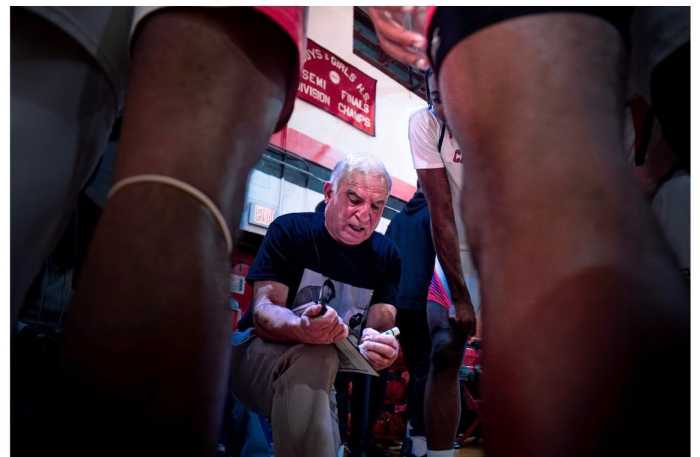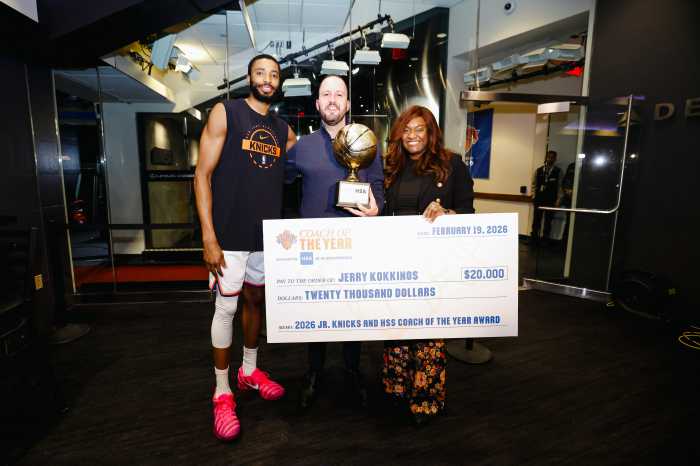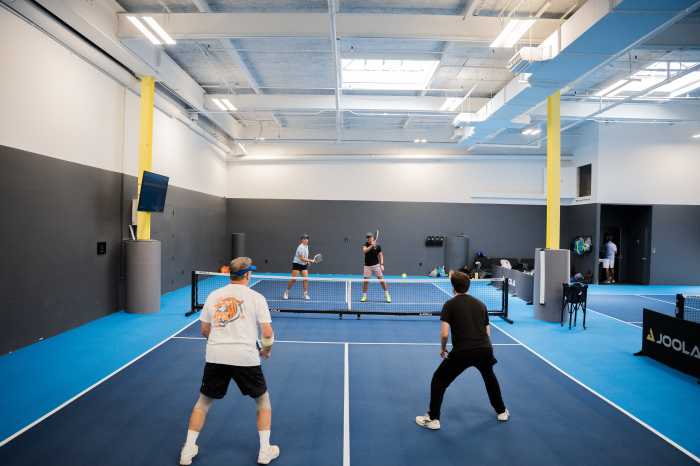Douglas Avellino knew that his grandfather sometimes had trouble watching his baseball games, that he might walk away and sit in the car if the action became too unbearable.
“He’d come to my games, and if I struck out, he’d be like, ‘Oh, sit down,’” Avellino says.
“I can’t take it,” Joe Reiff, 83, says, chuckling but entirely serious.
He knew, of course, why his grandfather found it so easy to be dissatisfied with a division-champion high school baseball team: Joe Reiff played semipro baseball, and he played it well. Trophies – not participation trophies, but batting title trophies – fill a corner of his and his wife’s Fresh Meadows home. Stories – not apocryphal, but backed up by newsprint – fill Reiff’s mind, even if he doesn’t always get around to sharing them.
What Avellino didn’t know about, however, was the giant shoebox that these days sits more prominently on the Reiffs’ kitchen table. In it, and not really spoken about until recently, are a pile of photos and some notebooks filled with newspaper clippings. Reiff had made more than a few headlines. “Lords Triumph in 49-46 Game; Joe Reiff Star,” reads one of them.
That’s an awfully high score for a baseball game, and the reason is that Reiff played basketball too. His abilities in both sports earned him a scholarship to Long Island University. The Richmond Hill native left school to work after his father suffered a stroke. At varying times, he was employed at a library, a medical pipe company, a roofing business – and, of course, there was baseball, his greatest love.
At John Adams High School, he played alongside Eddie Yost, the longtime Senators third baseman and onetime Mets third base coach. He surprised Yost years ago at an autograph signing; “You should be the one sitting here,” Yost said.
As for Reiff, he never really got a fair shot at playing in the major leagues. Invited by the Charlotte Hornets, a Washington Senators farm team, for a tryout, he was cut for fear that his osteomyelitis – a staph infection in Reiff’s leg bone – would curb his career prospects. Reiff has always had issues with his legs, and today he can only sit for a few minutes at a time.
Yet for the longtime second baseman, who played amateur ball in countless towns across the Northeast, baseball has always constituted an enormous part of life. “From morning ‘til night, he played ball,” says his wife Mildred. As an early adolescent, he skipped preparation sessions for his Bar Mitzvah and spent the time on the field instead; as an adult, he came home early from his honeymoon to play with friends, even though they didn’t believe he would really do so and thus never bothered to show up.
“I never went anywhere except to ball games,” says his daughter Irene Avellino, who grew up following sports and says that, in the Reiff household, “we didn’t talk about anything else.”
Douglas, meanwhile, knew little to nothing of the extent of his grandfather’s baseball background. They always spoke about sports; they rarely spoke about Reiff. That changed about a year ago, when Avellino asked to see an old jersey. Reiff came out with the giant shoebox, and his grandson was suddenly overwhelmed with history. He wrote about his grandfather in his college essay. The topic was about a personal idol.
Avellino, who graduates this year from Francis Lewis, plays catcher, not second base. Instead of putting up Ted Williams-like batting numbers, he demonstrates most of his skill from behind the plate. At Lewis, he has been remarkably good at throwing out stealing baserunners. And his picky grandfather gives him credit.
“He can run a little bit – and he’s got a better arm than I’ve got,” Reiff says.
Despite divergent styles, at least a few elements of their baseball lives have been shared. For one, they play a little fast-pitch softball together. Reiff’s team, where the ages vary from young professional to octogenarian, is not one of those softball sides for the faint of heart. It keeps him genuinely active – and that doesn’t apply just to Reiff.
“They’re good, some of those guys,” Avellino says. “They’re old, and they run faster than me sometimes.”
They also share that other similarity that can’t be ignored: Peering out from some of those circa-1950 photographs is a young baseball player who looks every bit like Douglas Avellino.
“I’m glad he plays,” Reiff says.


































